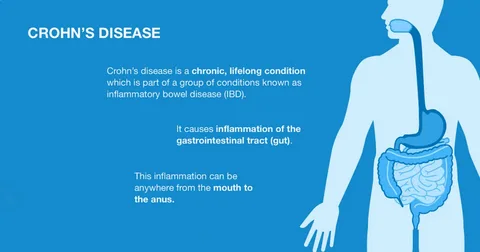
Nutritional Deficiencies and Crohn Disease
Understanding Crohn’s Disease and Nutritional Deficiencies
Crohn’s disease is characterized by chronic inflammation of the gastrointestinal tract, which can affect any part from the mouth to the anus. The inflammation disrupts the normal functioning of the digestive system, leading to symptoms such as abdominal pain, diarrhea, fatigue, and weight loss. One consequence of this inflammation is impaired nutrient absorption, resulting in nutritional deficiencies.
Common Nutritional Deficiencies in Crohn’s Disease
Several nutrients are commonly deficient in individuals with Crohn’s disease:
Iron
Chronic intestinal bleeding and poor iron absorption due to inflammation can lead to iron deficiency anemia.
Vitamin B12
Inflammation and damage to the terminal ileum, where vitamin B12 is absorbed, can result in deficiency.
Calcium and Vitamin D
Malabsorption of these nutrients can increase the risk of osteoporosis and bone fractures.
Folate
Reduced absorption of folate can lead to megaloblastic anemia and other complications.
Zinc
Inflammation and poor absorption can contribute to zinc deficiency, affecting immune function and wound healing.
Strategies for Managing and Preventing Nutritional Deficiencies
Managing and preventing nutritional deficiencies in Crohn’s disease involves various strategies:
Dietary Modifications
Opt for easily digestible foods during flare-ups, and maintain a balanced diet rich in nutrients during remission.
Supplementation
Some individuals may require supplements such as iron, vitamin B12, calcium, vitamin D, and zinc to address deficiencies.
Medication Management
Certain medications used to treat Crohn’s disease, such as corticosteroids and immunosuppressants, can affect nutrient absorption and metabolism.
Regular Monitoring
Periodic blood tests can help detect and monitor nutritional deficiencies, allowing for timely intervention.
FAQs About Nutrition and Crohn’s Disease
Can dietary changes help manage Crohn’s disease?
While dietary modifications cannot cure Crohn’s disease, they can help manage symptoms and improve overall well-being. Experimenting with different diets, such as low-residue or low-FODMAP, may provide symptom relief for some individuals.
Is it necessary to take nutritional supplements with Crohn’s disease?
Depending on individual needs and deficiencies, supplements may be beneficial. Consult with a healthcare provider or dietitian to determine if supplementation is necessary.
Can nutritional deficiencies worsen Crohn’s disease symptoms?
Yes, untreated nutritional deficiencies can exacerbate symptoms and increase the risk of complications such as anemia and osteoporosis.
Are there any specific foods to avoid with Crohn’s disease?
Trigger foods vary among individuals, but common culprits include spicy foods, high-fiber foods, dairy products, and fatty or fried foods. Identifying and avoiding trigger foods can help manage symptoms.
How can I improve nutrient absorption with Crohn’s disease?
Eating small, frequent meals, chewing food thoroughly, and avoiding problematic foods can aid digestion and absorption. Some individuals may benefit from enzyme supplements to enhance digestion.
Can nutritional deficiencies be reversed?
With appropriate treatment and management, many nutritional deficiencies associated with Crohn’s disease can be corrected over time. However, close monitoring and adherence to treatment plans are essential.
Are there any dietary recommendations during flare-ups?
During flare-ups, opt for easily digestible foods such as bananas, rice, applesauce, toast (the BRAT diet), and lean proteins. Avoid spicy, high-fiber, and greasy foods that may exacerbate symptoms.
Conclusion
Nutritional deficiencies are common in individuals with Crohn’s disease due to inflammation and impaired nutrient absorption in the digestive tract. Managing and preventing these deficiencies require a multidisciplinary approach involving dietary modifications, supplementation, medication management, and regular monitoring. By working closely with healthcare providers and adopting strategies to optimize nutrient intake, individuals with Crohn’s disease can improve their nutritional status and overall quality of life. Remember to prioritize nutrient-dense foods, listen to your body’s signals, and seek support from qualified professionals to develop a personalized nutrition plan that meets your unique needs and preferences. With proper care and attention, it is possible to effectively manage nutritional deficiencies and thrive despite the challenges of Crohn’s disease.
- Nutritional Deficiencies and Crohn Disease - April 11, 2024
- Ease Your Sugar Cravings with DIY Bitters - April 11, 2024
- How Your Diet Affects Migraines: Foods to Avoid, Foods to Eat - April 11, 2024



